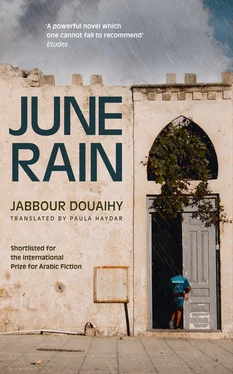Someone passed by Abu Jamil’s at night to warn them they must move away from there. ‘We won’t be able to protect you,’ they had said. That was how they threatened Abu Jamil. They also told us someone threw a rock at their window and broke the glass — not just once but twice. People also spread the rumour that they found a mark drawn on their door, but we searched for it and never found it. We also looked for the broken glass and didn’t find that either. They were determined to leave, though.
The porter finished piling the things from the house into the truck. He wasn’t able to lift the kibbeh mortar. It was a huge mortar made of sumac-coloured stone.
‘Just leave it there!’ Umm Jamil said.
No one offered to help.
The porter arranged the items from largest to smallest and from sturdiest to most fragile. The only way the people helped him was with their advice: don’t put wood on top of wood, use cushions to separate, that’s not placed well, it might fall out along the way. Moving household furniture required knowledge and skill. The porter worked, following the directions without looking to see which observer was giving them. In similar fashion, the people of the quarter always had a say in the goings on in Abu Jamil’s house. It was like an open-forum discussion of the children’s education, which doctors to choose and Abu Jamil’s early retirement. And on this day, too, the neighbours gave their opinions about their departure.
We were surprised at the way one man could empty out and stuff into that tight space all those items related to eating, drinking coffee, having get-togethers, sleeping, all the women’s whispered intimacies, the evening gatherings on hot summer nights and the children’s clamour that ended only at bedtime, the women’s morning social visits, the radio, the laughter, the tears — all the stuff of life that reverberated in Abu Jamil’s house. The loading was complete, so now the porter worked on securing everything. For the first time, some assistance was required to tie the ropes and pull them tight. He secured the load and sat on top of it, waiting. Now it was his turn to observe us.
Umm Jamil locked all the windows and doors. The driver started the motor. Umm Jamil looked at the neighbours and said, ‘Forgive our shortcomings.’
That was all. But she was thinking, I believe, about a lot of other things she never said. Maybe she was expecting the people of the quarter to hold onto them and never let them go.
The truck slowly made its way out of our narrow roads. We didn’t hop to our feet to direct the driver uphill. We were scattered and now it was behind the truck where the scene was unfolding. Umm Jamil and her children were walking behind the truck, wearing their house clothes and light shoes like they did every day. The truck disappeared around the first bend and they continued following behind. I got away from my mother and ran after them.
‘Don’t go too far!’ our mothers yelled.
We kids ran after them, staying some distance back. Each one had a role to play. They were leaving, never to return, and we were only escorting them. Dalal, who had grown physically but not mentally, joined us. The neighbours out on the balconies and in the middle of the street just stood silently after the truck left and Umm Jamil and her children disappeared around the bend. They stood looking at the closed door.
We followed after them silently. Occasionally Umm Jamil’s children would look back and their mother would admonish them to keep going. When they reached the road leading to the Upper Quarter, that is before they crossed the main road, they all turned to look back at us. Their mother looked at us, too. They turned in our direction. They didn’t wave to us, and they didn’t say a word before continuing on their way. We, in turn, looked at each other and went our separate ways back to our neighbourhood. Only Dalal continued to follow them. She was taken by what was happening and kept following behind the truck until we called to her to come back. She stopped for a moment in the middle of the road, confused, and then turned to head back to our quarter. Despite her massive size, Dalal didn’t know where the boundary of our quarter was and she wasn’t given the same warnings about not crossing the main road, possibly because no one feared she would be exposed to danger because of her naïveté.
The cat was more determined than Dalal. When I went back home, the circle of onlookers had broken up, so I immediately headed for the barrel where I had left the cat. I heard her meowing. She wasn’t dead. I lifted the cover and she jumped up to me, squinting and blinking from the sudden influx of light. She jumped down onto the ground, looked around, prepared herself a little, sniffed in and blew out her breath and started to run, run quickly. I went after her as fast as I could but wasn’t able to catch her. She went down the same road, the road the truck had travelled, the road Umm Jamil and her children had walked. She didn’t stop even for a second in front of the door to their house, didn’t even look in its direction, as if she’d never gone inside it before. She simply turned uphill and reached the main road, even though she had never been as far as the main road before. She crossed it like an arrow, as if it were a road she crossed every day, and then went right where the truck had disappeared with the porter riding on the roof wearing his copper badge, number 64.
Suddenly and with no advance warning, approximately two weeks after the departure of Abu Jamil’s family from the quarter, two men arrived at the door to the vacant house. They fiddled with it a little with a sharp object until it opened. I hurried to tell my mother only to find out that she already knew what was going on. I was surprised and continue to be surprised by the way the news had spread without any fuss. I wanted so badly to ask my mother how she knew that some people were going to come and occupy Abu Jamil’s house.
I later saw Abu Jamil’s new house, over there where they went when they left. I passed by their new house. They liked houses with open spaces in the front. They were sitting on wooden benches, drinking coffee in the early evening, and I got the feeling that they were happy and laughing. I didn’t see Abu Jamil as I passed by. No doubt at that time of day he was making his tour of visits with the neighbours — his new neighbours — wearing his robe and pyjamas. Abu Jamil’s house wasn’t far away in exile somewhere, as I had imagined. In fact, they had found a new life for themselves that didn’t include us and was far away from us. I had thought they would never recover from leaving our quarter and that taking up residence elsewhere would mean days of sadness and longing for us. Actually, I felt a little jealous. I didn’t want Abu Jamil’s family to be happy far away from us. My only consolation was hearing that in his new quarter Abu Jamil had stopped renting out bicycles. He had tried to keep it up but closed shop and sold all his bicycles when one of the children he rented to got into an accident and broke both his legs. I didn’t want Abu Jamil’s family to be happy where they were living, but I didn’t want to admit that I had started to like the people who occupied Abu Jamil’s old house. They kept nightingales in cages and they also drank coffee outside on moonlit nights.
Another Victim of Blind Vengeance?
From our correspondent in Tripoli:
The body of 41-year-old Jirjis Tanios al-Indari was discovered Friday morning inside his home in Barqa. The criminal investigation unit inspected the scene and determined he had been dead for at least twenty-four hours. The cause of death is yet to be determined, but in view of the current state of affairs in the northern town, ridden with acts of revenge, it appears that Al-Indari may have been the latest victim of the bloody series of events, though he does not belong to any of the major feuding families. An investigation is underway with the hope that this will mark an end to the violence in the centuries-old Lebanese town. The Sada Lubnan team wishes the town a speedy rescue from this ordeal so the rule of law and reason can once again solve the differences between its people.
Читать дальше












